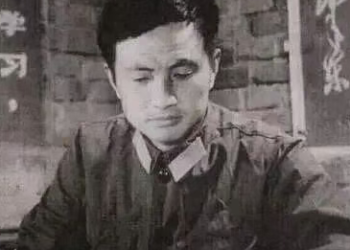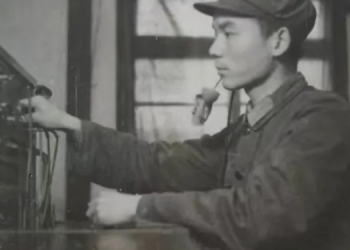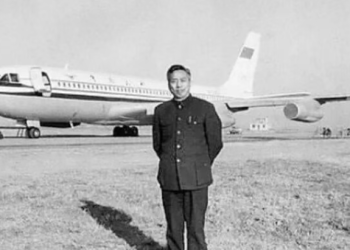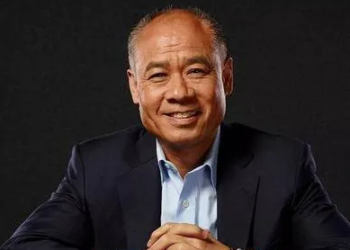“From tonight onwards, starting tomorrow, I will no longer pick up the microphone,” Fei Yu-ching joked. When fans urged him to keep telling jokes, he responded, “I will retire cleanly, like a passerby, just like an ordinary person.” A thousand-mile journey ends with a farewell; there will be no more meetings in the future, and we must part ways with care. “Thank you, everyone. Take care, take it slow. We will meet again someday.”
In the winter of 1988, the Taiwanese TV drama “Yijianmei” (A Cut of Plum) was broadcast on China Central Television (CCTV), its intricate plot causing a tremendous stir at the time. The theme song of the same name also became widely popular, and its performer, Fei Yu-ching, quickly entered the public’s eye. Over thirty years have passed since then, and that song, “Yijianmei”, remains ever-popular, becoming a “label” that Fei Yu-ching is forever associated with.
Twenty-seven years later, in 2015, the film “Goodbye Mr. Loser” became a surprise box-office hit, playing the “nostalgia card” to great effect. The song “Yijianmei” reappeared, gaining new meaning through the movie. In the 1980s, when fireworks and poetic feelings burst forth, if one could say that the myriad plum blossoms were fragrant for just one person, it would certainly be the “Golden Voice King,” Fei Yu-ching.
In 1972, a 17-year-old boy, mature beyond his years, was pushed onto the stage of the famous nightclub “Disco Corner” by his older sister, Fei Zhen-ling (born Zhang Yan-qiong), who had already debuted. The boy, dressed in a well-fitted dark suit with a three-seven part hairstyle, looked like a government official, completely out of place in the glitzy environment. As glasses clinked and the audience watched him hesitantly, the scene that unfolded was nothing short of remarkable: a rich, mellow male voice, flowing and captivating. When the performance ended, his sister, looking at the boy who had once only dared to sing at home, said, “Actually, you were born for the stage.”

The next day, the boy’s name appeared at the top of the program, but it wasn’t his real name, Zhang Yan-ting. Instead, it was the stage name his sister had created for him—Fei Yu-ching. In 1972, the young boy bid farewell to the hesitant Zhang Yan-ting and officially debuted as the singer Fei Yu-ching. Over the next four to five years, he became a warm, jade-like presence in Taiwan’s major show venues. He would lightly tap his toes to the rhythm, tilt his head back, and hold the iron microphone high as he sang. Wherever he performed, it was always a scene of singing and dancing in full swing. Many years later, imitators often focused on capturing his signature 45° head tilt, but little did they know, he wasn’t just looking at the ceiling; he was gazing at the memories of that era.
In the 1980s, Taiwan’s pop music scene was flourishing, with a wealth of talent emerging. Teresa Teng, Feng Fei-fei, Luo Dayou, Li Zongsheng… Any one of these artists could fill a lengthy story, and many of their songs are still widely regarded as classics today. Back then, what was harder to obtain than talent was opportunity. Amid the tide of the times, Fei Yu-ching, a fresh face in the industry, seemed to be forever brushing past higher stages. At that time, his older sister, who had already earned the title “Venus of the East” in Japanese cinema, made the bold decision to leave her successful career and return to Taiwan to support her younger brother. Through her connections, Fei Yu-ching met Taiwan’s top-tier musician, Liu Jia-chang.
Liu Jia-chang, known as the “Godfather of Music,” had written over 2,500 songs by 2010, including classics such as “Yue Man Xi Lou”, “Wang Shi Zhi Neng Hui Wei”, “Wan Qiu”, and “Yi Lian You Meng.” Upon meeting Fei Yu-ching, Liu was immediately struck by his voice, remarking, “Xiao Ge (Young Brother) is Taiwan’s most beautiful voice.” In 1975, Liu composed “Wan An Qu” (“Goodnight Song”) specifically for him, a song that later became the closing tune in shops, restaurants, and other public spaces across Taiwan. This song, often considered the Taiwanese version of “Auld Lang Syne,” successfully launched Fei Yu-ching into the top tier of Taiwan’s music scene.
At the time, Liu Jia-chang was the exclusive composer for the renowned Taiwanese screenwriter Qiong Yao, and Fei Yu-ching naturally became the “official male singer” of Qiong Yao’s dramas. Subsequently, more than 60% of the theme songs for Qiong Yao’s works were deeply sung by Fei Yu-ching, making him one of the most sought-after stars of the era.
In 1984, Fei Yu-ching stood in the spotlight, bewildered, as he received the Taiwan Golden Bell Award for “Best Male Singer.” In the three previous years, he had been nominated three times, only to lose out each time to his fellow male artist Liu Wen-zheng. On his fourth attempt, with the song “Meng Tuo Ling” (Dream Camel Bells), he finally cleared his name and took home the coveted award. During the award ceremony, he said, “This truly feels like a late spring. While an early arrival would certainly be joyous, a late one is not regrettable.” That year, Fei Yu-ching was 29, and his victory marked the end of an era, symbolizing a generational shift between two male giants of the Taiwanese Mandarin music scene.
In an era when Teresa Teng was reigning as the queen of Chinese pop, it was often said, “For Mandarin love songs, Teresa Teng is the queen, while Fei Yu-ching is the king.” Known for his timeless image of a suit that rarely changed, Fei Yu-ching became affectionately known as the “civil servant of the entertainment industry.” In truth, Fei Yu-ching embodied the spirit of a public servant, dutifully serving his audience—his melodious voice not only charmed listeners but also brought joy to the variety show circuit, earning him the nickname “Nine-Turned Bird” (a bird in nature known for its ability to produce a variety of melodious sounds).

At one point, someone asked Fei Yu-ching the secret to his enduring success. With a playful smile, he responded, “Even the gods focus intently when they go to the bathroom.” Such humor and clarity made him a breath of fresh air in the industry. Fei Yu-ching was a perceptive man. He knew exactly what his audience wanted from “Fei Yu-ching”: “Some people want to hear you sing beautifully, while others want to hear you entertain with some interesting jokes.” He understood that no one wanted to sit upright and listen to songs in formal settings during their leisure time, so harmlessly playful jokes became the most humanizing way to break the ice. Yet, he always knew how to balance it perfectly—whether with witty remarks, a light touch, or blending seriousness with humor, he mastered the art of timing.
At his final farewell concert, Fei Yu-ching, as always, took the stage with nothing but a glass of water, delivering 130 minutes of musical brilliance, performing dozens of timeless classics. However, his widely beloved song “Qian Li Zhi Wai” (Thousands of Miles Away) was performed without accompaniment, only softly hummed. The reason for this is likely tied to the eternal theme of love and regret—something that has lingered through the ages. Even today, at the age of sixty, Fei Yu-ching remains without a partner by his side, without children or grandchildren to surround him. It’s not that he is detached from the world, but rather that his love is deep and unfulfilled, a love that was never fully realized.
In 1981, at the age of 26, Fei Yu-ching held a grand engagement ceremony with a Japanese woman named Anjo Chie, walking the red carpet of the Golden Bell Awards together and publicly declaring his love for her. The two had fallen in love at first sight during the 1970s when Fei Yu-ching was just starting to rise to fame. They promised each other a lifetime together when he achieved success, and their relationship seemed like a match made in heaven. Yet, as life often goes, fate played its hand.
Soon after their engagement, Anjo Chie’s father invited Fei Yu-ching to Japan to discuss matters. Anjo’s family was a prominent business family, and they did not think highly of Fei Yu-ching’s artistic career. They demanded that he leave the entertainment industry, move to Japan, and adopt the Japanese custom of the child taking the mother’s surname. Fei Yu-ching, a proud man, was unwilling to give up his singing career or submit to living in a foreign country. After much contemplation, he told Anjo, “If you want to be with me, stay. I will not go to Japan. If you choose to leave, I will send you away.”
Faced with pressure from her family, Anjo Chie ultimately chose to break off the engagement. Decades later, in 2006, Fei Yu-ching and Jay Chou recorded “Qian Li Zhi Wai” (Thousands of Miles Away), and the lyrics writer, Fang Wen-shan, recalled, “Fei Yu-ching almost shed tears in the recording studio.” Perhaps the greatest regret in life is that the person you long for is right there, yet out of reach.
After their separation, Anjo Chie married another man but would occasionally visit Taipei with her children to attend Fei Yu-ching’s concerts. As old friends, they would meet again, inquire about each other’s well-being, and find it difficult to hold back their emotions. In the years that followed, Fei Yu-ching did have other companions. A few years ago, Taiwan’s diva, Jiang Hui, publicly stated, “Fei Yu-ching would make a wonderful partner. If we are both still single when we grow old, we will choose to marry.” To which Fei Yu-ching replied, “Love is not something you can ignite just by holding hands. You cannot settle for anyone in your life.”
As the fleeting years go by, looking back, Fei Yu-ching is now 64 years old. Through his decision never to move to Japan, he demonstrated his commitment to both loyalty and filial piety. His lifelong vow of celibacy also stands as a proclamation: “No one else will do, but her.”

For many years, Fei Yu-ching lived a solitary life, which made his parents and family all the more precious to him. Though his parents divorced when he was young, he never harbored resentment. He once said, “I have never lacked love.”
On a television program, he spoke movingly about his parents’ devotion: “Being a parent is a life sentence…”
As a child, Fei Yu-ching lived with his mother; as an adult, she lived with him. Whenever he took on commercial performances, his only condition was that he could bring his mother along. Whenever he held concerts, she was always in the audience, listening with pride.
Throughout his more than forty years in show business, wherever he sang, his mother went with him.
In 2010, his mother passed away. Fei Yu-ching once held his elder brother Chang Fei’s (real name Zhang Yanming) hand and pleaded, “Don’t rush to bury Mom. Even if she stays in the cold chamber for two or three years, it’s fine. I just want to be near her a little longer, to feel like she’s still here.”
In 2013, Fei Yu-ching held another personal concert tour, just as he did every year. During the final show that year, he opened with his classic song A Friend Like You. Yet after singing just one line, his voice broke. He covered his mouth with his hand, trying to calm himself.
For two long minutes, Fei Yu-ching stood silently on the stage as the band continued playing behind him. Thousands of words of longing caught in his throat, unspoken.
When the song finally ended, he said through tears:
“Since my mother passed away, I’ve felt that my life has become incomplete. I’ve lost my motivation to strive forward, and even now, I haven’t fully walked out of the sorrow of losing her.”
Although he hadn’t officially retired at that time, Fei Yu-ching stopped his annual concert tradition thereafter. He turned down many commercial performances, even declining an invitation to the 2017 Spring Festival Gala. He said he wanted to spend more time with his aging father.
In 2017, his father, Zhang Wu-xi, passed away. This time, he did not cry as he had for his mother. Instead, he continued to appear at every scheduled event, calm and composed, still elegant and humorous as ever.
He said, “As an artist, I have no right to grieve publicly.”
His father’s last words were: “Don’t worry about me. Fulfill your contracts and do what an artist should do.”
“Ah, how deep the parents’ toil to raise their child.”
The moral lessons and gentle guidance of his parents became Fei Yu-ching’s lifelong spiritual anchor.
He remembered how, when his father worked in a government office, he would always wear formal attire whenever he had an official appointment. From that, Fei Yu-ching learned — and so, he was always impeccably dressed, because for him, the stage was the most important appointment of all.

He was like his father’s bamboo flute — imbued with his parents’ love, walking alone, yet still producing melodies both beautiful and sorrowful.
He honored his father’s wishes, achieving true harmony between virtue and artistry. Before the public, he remained witty and graceful, always bringing smiles to others. But on the anniversaries of his parents’ deaths, he was uncharacteristically quiet.
A year after both parents had passed away, Fei Yu-ching announced his decision to retire:
“For so many years, I’ve been striving forward, chasing perfection, and I’ve forgotten to enjoy the scenery along the way. After my parents left, I suddenly felt I had no home to return to — no one to share my joy or success with. The dazzling stage now only makes me feel lonelier. It’s time to stop.”
At his final concert, his agent of over ten years shared that Fei Yu-ching was holding back tears. “When he sang the first song, his lips were trembling,” the agent recalled. “Though we all knew this day would come, none of us dared to mention the words ‘retirement,’ because we had already cried enough.”
When Fei Yu-ching reached the song When Will You Return, tears shimmered in his eyes. But he quickly wiped them away and immediately apologized to the audience, admitting that he had lost composure.
Saying goodbye is never easy. His close friend, veteran host Fang Fang, commented: “I know that singing was the greatest love of his life. The decision to retire must have been a difficult internal struggle for him.” Fei Yu-ching himself said: “When I put down this microphone, I might feel lost. But once I decide to retire from the entertainment world, I will retire completely, like a stranger passing by.”

The moments we share are fleeting, and every reunion eventually leads to parting. How long until eternity, and how much passion does it take for youth to feel fulfilled? Life is short, and few are truly complete. Fei Yu-ching chose the most graceful, thoughtful way to bid farewell to the music world he loved so much, saying goodbye to the fans who had supported him throughout his life.
On November 7, 2019, after singing his final song The Evening Bell of Nanping, Fei Yu-ching choked up several times and said: “Goodbye, friends. Thank you all! If fate allows, we shall meet again. Don’t hesitate to greet me when we do.”
His fans exchanged their goodbyes, and from then on, the world would no longer hear “Fei Yu-ching.” His brother, Chang Fei, said, “When he finishes his last performance, I’ll go home and make him a fried egg.”
From then on, the world would know him as Mr. Zhang Yan-ting, the man who would one day, somewhere, care for the red leaves on branches and the birds and insects by his side. Mr. Zhang liked to take the train, and perhaps one day, someone might meet him at a train station, watching him walk toward them. They’d say, “May you be well,” as he passed by.
But on the journey of life, no one can accompany you from start to finish. After sharing a limited amount of time together, we must part at some unforeseen station, on some unforeseen day. And there, we bid farewell, never to meet again.
As he continues his journey, we wish him all the best in the rest of his life.











